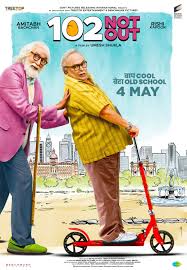Age is just a number, and some people live by this motto more than others. 102 Not Out is a heartwarming dramedy starring two of Bollywood’s finest—Amitabh Bachchan and Rishi Kapoor—set in the bustling city of Mumbai. The film, directed by Umesh Shukla, revolves around the concept of aging, but not in a typical, somber manner. Instead, it takes a refreshing comedic approach. Based on a Gujarati play, this film beautifully blends family drama with quirky humor, offering an emotional ride that’s both poignant and entertaining.
The story focuses on a 102-year-old man, Dattatraya Vakharia, played by Amitabh, who is full of zest for life and has no intentions of slowing down. On the other hand, his 75-year-old son Babulal, portrayed by Rishi, is quite the opposite. Babulal is grumpy, cautious, and stuck in a routine, living a life of monotony. Dattatraya, with his childlike enthusiasm, finds his son’s attitude depressing and makes it his mission to inject a sense of adventure and joy into Babulal’s life. He even threatens to send his son to an old-age home unless Babulal meets his unconventional demands. What follows is a series of heartwarming and humorous moments that redefine the father-son dynamic and make you question societal norms surrounding aging and living life to the fullest.
A standout feature of this movie is the stellar performances by both Amitabh and Rishi, who seamlessly carry the entire film on their shoulders. Amitabh, as the energetic, youthful father, is a joy to watch. His comedic timing is spot on, and he brings an infectious enthusiasm to the screen. Rishi, playing the role of a conservative, emotionally restrained son, complements Amitabh’s exuberance with his subtle expressions and measured performance. Their contrasting personalities create a wonderful chemistry that keeps the narrative engaging throughout. It’s a delight to see these two veteran actors sharing screen space after decades, and they do so with ease, making their characters believable and relatable. Amitabh’s playful banter and Rishi’s deadpan reactions create a dynamic that adds layers to the film’s emotional depth while maintaining a light-hearted tone.
Direction by Umesh Shukla deserves applause for balancing comedy with emotional undertones so effectively. He manages to weave humor into even the more serious themes of aging, loneliness, and regret without making the film feel heavy. Shukla’s background in theatre comes through in his ability to focus on character interactions, which forms the crux of the story. The direction keeps the audience connected to the emotional pulse of the movie, while also ensuring it doesn’t become overly sentimental. The simplicity of the narrative works to its advantage, allowing the two lead actors to shine without overwhelming the audience with too many subplots or unnecessary drama. The pacing is tight, and the film rarely lags, keeping the viewer’s interest intact throughout.
The film’s cinematography by Laxman Utekar is subtle yet effective, capturing the essence of Mumbai’s suburban life. The focus on the Vakharia household and its surroundings allows for intimate, almost theatrical framing that suits the narrative. The use of lighting and colors reflects the contrasting moods of the two protagonists—Dattatraya’s world is bathed in bright, warm tones, while Babulal’s scenes are often shot in more muted, somber hues. This adds a visual layer to the storytelling, underscoring their different outlooks on life. The film’s cinematography does not aim to impress with grand visuals but rather complements the simplicity of the story.
Music, composed by Salim-Sulaiman, is understated yet fitting for the narrative. The songs don’t overshadow the storyline but rather blend in seamlessly, enhancing the mood of the scenes they accompany. Tracks like “Bachche Ki Jaan” add a playful vibe to the father-son dynamic, while the background score gently nudges the emotional beats without overpowering them. The film doesn’t rely heavily on its music, which works in its favor, as the focus remains on the characters and their evolving relationship. The use of sound is minimalistic, yet it amplifies the emotions of the film effectively.
The theme of aging is beautifully handled in the film. It flips the typical narrative of older individuals being portrayed as frail and dependent. Instead, Dattatraya, the 102-year-old, is full of life and joy, while his 75-year-old son has given up on excitement. The film delves into the idea that growing old doesn’t mean losing the will to live or having fun, and it encourages breaking free from societal expectations surrounding age. The story challenges stereotypes about how the elderly should behave and live, reminding viewers that the spirit of adventure knows no age. This refreshing approach to aging, paired with the comic relief that runs throughout the movie, keeps the tone light yet meaningful.
Another commendable aspect of 102 Not Out is its concise runtime. At just under two hours, the film doesn’t stretch itself unnecessarily. Every scene serves a purpose, whether it’s to build on the father-son relationship or to further explore the theme of finding joy in life regardless of age. The absence of unnecessary characters or subplots makes the story focused and impactful. The dialogues, too, are sharp and witty, particularly the exchanges between Amitabh and Rishi, which are laced with humor, wisdom, and warmth.
In conclusion, 102 Not Out is a feel-good film that succeeds on multiple levels. The performances of Amitabh and Rishi are exceptional and carry the film, while Umesh Shukla’s direction keeps the narrative light yet emotionally resonant. The themes of aging and family are handled with care, offering both humor and poignancy. The cinematography and music, though subtle, enhance the overall experience, making the film an engaging watch. For those who enjoy heartwarming family dramas with a comic twist, this movie is a must-watch. It’s a refreshing take on aging that will leave you smiling, with the underlying message to live life to its fullest—no matter how old you are.







